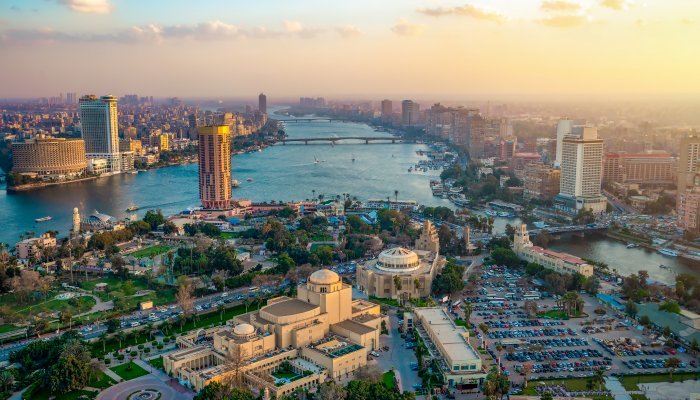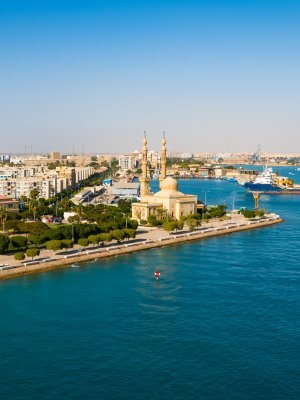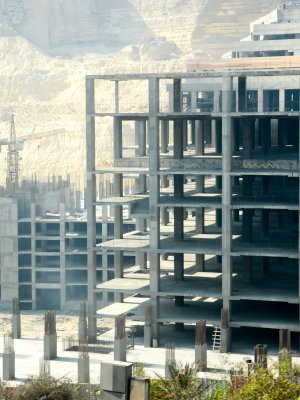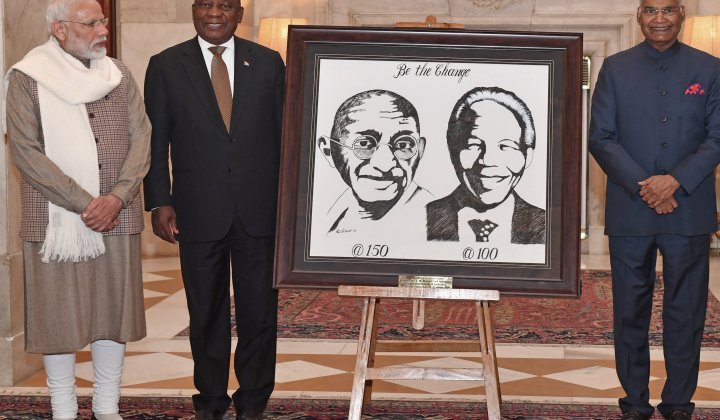The sandy fringes of Egypt’s capital, Cairo, are strewn with rows of half-finished high-rise buildings and new roads and highways that have yet to have a car drive on them.
The projects are part of an ambitious project to decentralise Cairo, one of the world’s most densely populated cities, and to generate new development both on the edges of the city and elsewhere. In total, nine new cities are planned, including a new capital, for this country where its almost 100 million people live on just 6% of the land, clustered around the Nile River.
These urban mega-projects are part of a much bigger restructuring of the country’s economy – Africa’s third-largest after Nigeria and South Africa – driven by President Abdel Fattah el-Sisi to take the country into a more modern future after years of economic stagnation.
Egypt, despite continuing political and security challenges, has become Africa’s most attractive destination for investment by global multinationals while many foreign companies with deep roots in the country are investing for future growth in Africa’s third most populated market.
Reforms work
It has come a long way from the disruption of the 2011 revolution in which long-time leader, Hosni Mubarak, was forced to step down after 30 years in power. Egypt turned to the IMF in 2016 for help in addressing its significant economic challenges and is now winding down the US$12 billion loan package that enabled it to start a rapid and wide-ranging reform programme.
The expansion of the canal to allow two-way traffic has been a bonus for Egypt...
The figures show that something must be working. Foreign direct investment jumped from US$4 billion in 2014 to US$6.4 billion in 2015 and again to US$9.5 billion in 2017. The government of el-Sisi, who came to power in mid-2014, hopes to push this above US$11 billion in 2019, although investment did slow in 2018.
In 2017, Egypt reported its highest economic growth in a decade of 5.3%, which rose to 5.6% in 2018.
The energy sector is the biggest driver of growth and investment. The country is moving from years of power blackouts under Mubarak towards self-sufficiency as a result of large investments in exploiting new gas finds off the coast, and in renewable energy, taking advantage of large expanses of desert. It aims to be an exporter of power in the next few years.
Interest is also high in the Suez Canal Economic Zone, with industrial investment lining up to take advantage of the expanded strategic waterway linking European traders to the Indian Ocean. The expansion of the canal to allow two-way traffic has been a bonus for Egypt, with US$4.2 billion raised in transit fees in 2018 alone. Massive public infrastructure spending by the state is keeping growth buoyant even while it drives up debt.
Egypt’s positive performance on a range of business and investment indicators in the past year highlights the impact of the government’s reform process on the operating environment. The country moved up eight places on the World Bank’s 2018 Doing Business Index. It also rose from 114th place on the World Economic Forum’s Global Competitiveness Index 2017 to 94th place in the 2019 rankings.
The Heritage Foundation’s 2018 Index of Economic Freedom shows an improvement in Egypt’s overall economic freedom thanks to improvements in financial freedom, investment freedom, and business freedom.
Egyptians in diaspora are making an increasing contribution to revenues, encouraged by the devalued currency. Remittances rose by 38.9% year-on-year in 2017 to an estimated US$20 billion – a vital foreign exchange lifeline for the country. Egypt is the biggest recipient in Africa, receiving more than 60% of remittances to North Africa.
At a price
But even as the country’s economy ramps up, times are tough in Cairo. The IMF loan came with some tough terms, which are taking their toll on households and on companies.
The energy sector is the biggest driver of growth and investment...
The floating of the Egyptian pound in 2016, just ahead of the IMF deal, led to a 50% devaluation of the currency overnight, which sent the economy into shock. This was followed by the phased process of removing long-standing fuel and electricity subsidies that led to spikes in prices and drove inflation to an all-time high of nearly 34% in 2017.
The president asked Egyptians to roll with the punches, saying the reforms were necessary in order to address entrenched practices of the past that made Egypt inefficient, expensive and uncompetitive. To offset the economic pain, the government has a raft of measures in place to support the growth of small and micro companies. and has also introduced new social safety nets.
Although the weaker currency has been good for investment and for the critical tourism sector, it has also made imports more expensive, and the high cost of living has severely dented consumer demand, undermining investment in the retail sector. Many companies have not survived the hardships, while others have had to adjust their operating models and cut margins to survive rocketing prices.
Looking to Africa
Egypt’s advantages are considerable. Its geography is favourable, making it ideally placed to link western and eastern markets to each other and to Africa. It is Africa’s third largest economy and it is also the third most populated African country after Nigeria and Ethiopia, offering investors a potential market of about 100 million people.
And Africa is very much on the radar of el-Sisi, who wants to reconnect Egypt to the continent after years of neglect by his predecessors, notably Hosni Mubarak, Egypt’s leader for 30 years. The ambitions of el-Sisi have been given impetus by the African Union, which elected him as chair of the organisation for 2019.
Egypt’s links with Africa are not new. The country was a founding member of the AU’s predecessor, the Organisation of African Unity, which it chaired in 1964, 1989 and 1993. It is linked to 10 African countries through the Nile River.
The country has been a member of the trade bloc COMESA since its launch in 2000 and a driver of the three-bloc Tripartite Free Trade Area (encompassing COMESA, the Southern African Development Community, and East African Community), which was launched in Egypt’s resort town, Sharm el Sheikh, in 2015. Egypt was also one of the 44 countries that signed up to the Continental Free Trade Area at its launch in 2018.
Africa is very much on the radar of el-Sisi...
Large and well-resourced Egyptian multinational companies, already well-established in North Africa, are looking to expand their investments and projects into Sub-Saharan Africa.
Diversified energy company Elsewedy, for example, has completed projects in more than 15 African countries and it has been contracted alongside Egypt’s giant state-owned company, Arab Contractors, to build the 2100MW Stiegler’s Gorge hydroelectric dam project in Tanzania. In 2017, investments in Africa amounted to approximately US$7.9 billion distributed over 62 projects.
Domestic politics
However, even as the dust starts to settle on the economic reforms in Egypt, there are other challenges. The economic success story has been tainted by the government’s intolerance of political opposition and the clampdown on political opponents, especially anyone suspected to be linked to the Muslim Brotherhood, the party that took over following Mubarak’s resignation but was removed by the military after widespread protests in 2013.
El-Sisi’s defence is that the harsh measures are necessary to ensure the security of Egypt both internally and regionally given its location in a difficult neighbourhood. His critics, including powerful international human rights organisations, are not buying it, calling him a brutal dictator. They also maintain that the recent referendum in which Egyptians overwhelmingly voted for constitutional changes to extend el-Sisi’s stay in power to 2030 was not free and fair, with the outcome leading the country down an increasingly militaristic and autocratic path.
El-Sisi’s political issues have not dented his international profile with investors and world leaders, who consider Egypt to be a strategic and fast-growing market. He travels widely to meet presidents and was recently at the G7 meeting in France.
The roller-coaster ride of el-Sisi’s rule, which has brought much development, has not yet made a real dent in the lives of ordinary Egyptians, particularly at the lower socio-economic levels. The growth has yet to be inclusive, with unemployment still a major issue.
Many of the contracts for Egypt’s mega projects have been taken up by the military. El-Sisi says the army is good at delivering large projects on time and within budget, and given the urgency of his programme, they are best placed to execute them. But critics point to a programme that has been big on money and low on jobs.
The Central Agency for Public Mobilisation and Statistics also says Egypt’s poverty rate in 2017-18 rose to 32.5% from 27.8% in 2015.
Looking ahead
The government believes its multi-pronged programme to boost the growth of small and medium enterprises, which is supported by international development agencies, will bear fruit in time as the reforms begin to mature.
Business leaders concur, saying they expect to realise the fruits of the programme in a few years’ time. Already, inflation is heading down to single digits and growth is picking up.
It is too soon to tell whether Egypt will continue on its current growth trajectory or falter once the IMF programme ends. The country received the final tranche of IMF money in mid-2019 and observers have asked whether the country has built sufficient momentum to maintain the programme or whether economic hardships experienced by ordinary people will lead to a political backlash.
But for now, the government is going forward will all guns blazing, planning to increase its debt in 2019-20 by 26% with a US$48 billion loan to keep the reform balls in the air in the hope that, eventually, all the threads will come together making Egypt the African success story the president wants it to be.







